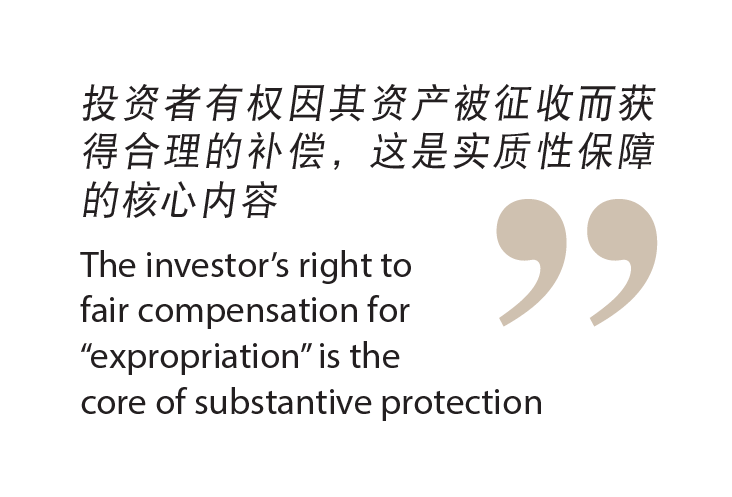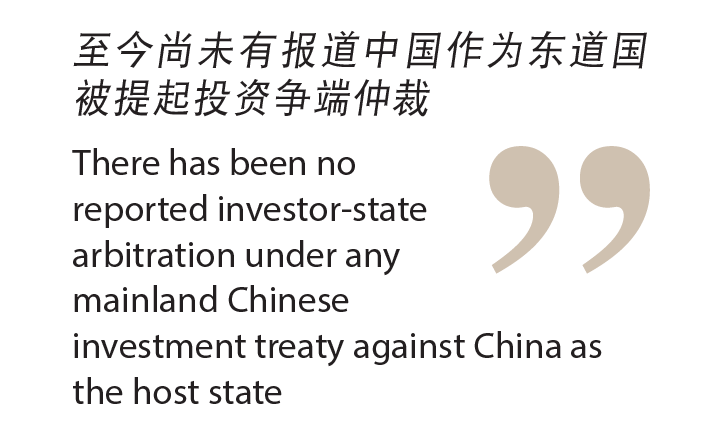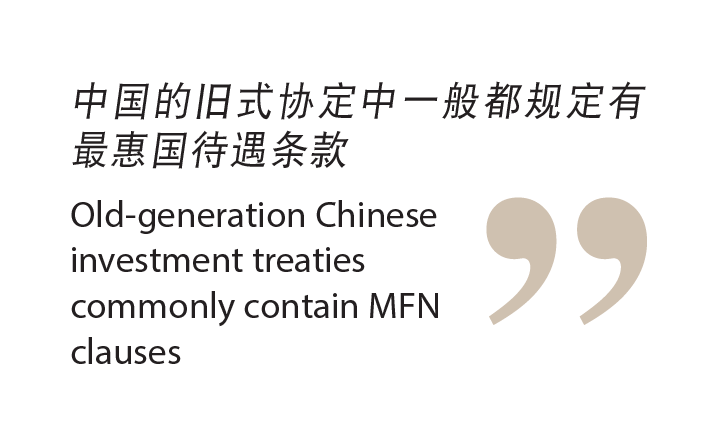Recent rulings by arbitration tribunals under bilateral investment treaties may give cross-border investors more rights than they realize, by Paulo Fohlin
The protection offered by bilateral investment treaties is potentially important to any individual or company that has business activities outside its home country or acquires shares or similar rights in companies outside its home country. As a result of recent developments, investment treaty protection is now highly relevant to Chinese investors investing outside China, as well as to foreign investors investing in China.
Since 1998, China has concluded some 25 “new generation” bilateral investment treaties and foreign trade agreements. In these treaties and agreements, investor-state arbitration clauses grant investors from the two contracting states the right to arbitrate against the host state if they believe it has breached any of the promises it made in the treaty or agreement.
China’s “old-generation” treaties, which were concluded with more than 100 countries and most of which are still in force, do not grant investors from the two contracting states such unrestricted right to arbitrate against the host state. However, two recent decisions made by tribunals in pending arbitrations under the investment treaties between Spain and Russia and between China and Peru may go a long way to establish that even the old treaties offer important protection. Both tribunals held, independently of each other, that they did have jurisdiction to decide on an alleged expropriation of an investor’s assets by a state under a restricted arbitration clause bearing resemblances to many arbitration clauses found in old-generation Chinese investment treaties.
To investors protected by an old-generation treaty, the decisions of the same two tribunals on the interpretation of the most favoured nation clause may also fundamentally affect whether or not there is a right to arbitrate against the host state.
Substantive protection
Investment treaties contain a set of provisions on the protection of a foreign investor’s investment in the host state, against, among other things, expropriation and similar measures. These provisions are sometimes referred to as “substantive protection”.
The investor’s right to fair compensation for “expropriation” is the core of substantive protection. Like the “investment” concept (see Treaties aim to encourage investment on page 55), the concept of “expropriation” is usually quite broad. It includes not only formal or direct expropriation or nationalization of title to property, but also other measures having similar effect, usually called “indirect” expropriation. In addition, due to the broad definition of “investment”, other things such as contractual rights can be “expropriated”. A common case may consist of the actions of several different state organs combined, leading to a deprivation of the investor’s enjoyment of the investment. Intent to deprive, or economic benefit to the host state, is not necessarily required. Examples include a revocation of a licence to run a certain business, excessive taxation, and interference in contractual rights.
Without an applicable arbitration clause in an investment treaty, an investor from overseas would have to seek local remedies for any expropriation or other alleged breach against the host state – if any were available – before the local courts or administrative authorities. This is likely to be unattractive to the investor, especially where the investor doubts the host state’s good intentions, or the independence of the courts or other relevant authorities of the host state. (For a summary of the forms of protection that bilateral investment treaties typically offer, please refer to Common provisions of bilateral investment treaties on page 57.)
Procedural protection
In addition to substantive protection, and with very few exceptions, investment treaties also contain “procedural protection” in the form of an arbitration clause which may be used by the investor against the host state. The scope of application of investor-state arbitration clauses in investment treaties varies. It is, however, common that, like in the new-generation Chinese treaties, such clauses apply to disputes concerning alleged breaches of any of the substantive promises made by the host state in the treaty, as well as the calculation of damages for such breaches. As an example, the new-generation investor-state arbitration clause found in mainland China’s so-called “model” bilateral investment treaty of 2003 covers “any legal dispute … in connection with an investment”.
Unrestricted new-generation investor-state arbitration clauses, similar to the one in the 2003 “model” treaty, are found in China’s bilateral investment treaties with Barbados (1998), Botswana, Brunei, Jordan, Trinidad and Tobago, Guyana, Côte d’Ivoire, Djibouti, the Netherlands, Bosnia-Herzegovina, Germany, Finland, Iran, Benin, the Republic of Korea, the Russian Federation, Belgium-Luxembourg, Spain, Sweden (protocol of 2004 supplementing China’s first investment treaty, which was concluded with Sweden in 1982), France, the Czech Republic and India. Such arbitration clauses are also found in the investment chapters of China’s recent free trade agreements with Pakistan, New Zealand and Singapore.
However, sometimes, the scope of application of investor-state arbitration clauses in investment treaties is restricted, like in the old-generation Chinese treaties. For instance, the investor-state arbitration clause in the old-generation Chinese treaties with Australia, Argentina, Bulgaria and Denmark require that the dispute in question relates to the “amount of compensation” payable for an expropriation.
Clearly, such restricted arbitration clauses would not cover disputes concerning alleged breaches of treaty promises other than the promise not to expropriate without fair compensation. Thus, the common treaty promises to exercise “fair and equitable treatment”, the promise to afford “full protection and security” and the promise not to subject the investment or investor to “arbitrary or discriminatory measures” (see Common provisions of bilateral investment treaties on page 57) would not be covered by such a clause.
Commentators sometimes assume that restricted arbitration clauses such as those found in the old-generation Chinese treaties would not cover disputes concerning whether an expropriation occurred or not, but only disputes concerning the quantification of compensation for an expropriation that has admittedly occurred, or the existence of which has been established in a competent court or body of the host state. However, there may now be sound reasons to question any such assumption.
Procedural rules applicable to investment treaty arbitrations
Under investor-state arbitration clauses in investment treaties, it is often the case that the investor may choose between International Centre for Settlement of Investment Disputes (ICSID) arbitration and United Nations Commission on International Trade Law (UNCITRAL) ad hoc arbitration under the UNCITRAL Arbitration Rules of 1976. Sometimes, the investor may choose institutional rules, such as the Arbitration Rules of the Arbitration Institute of the Stockholm Chamber of Commerce or, less often, other rules such as the Arbitration Rules of the International Chamber of Commerce.
The overwhelming majority of existing investment arbitrations are ICSID arbitrations. Such arbitrations have no “seat” in the sense that no national arbitration law is intended to apply to ICSID arbitrations with respect to challenges to things such as arbitral awards. Instead, challenges to ICSID awards are made only in accordance with rules provided for in the ICSID Convention itself, and challenges are decided by ad hoc committees constituted for each case under rules also found in the ICSID Convention. As regards investment treaty arbitrations other than ICSID arbitrations, Sweden is said to be the most common seat. These Swedish investment treaty arbitrations are either UNCITRAL ad hoc arbitrations or arbitrations conducted under the Arbitration Rules of the Stockholm Chamber of Commerce.
In the past, China was reluctant to provide for ICSID arbitration in its investment treaties. China preferred UNCITRAL ad hoc arbitration or institutional arbitration under the Arbitration Rules of the Stockholm Chamber of Commerce. The new-generation bilateral investment treaties that China has signed entitle the investor to choose between ICSID arbitration and UNCITRAL ad hoc arbitration. China acceded to the ICSID Convention, with effect in 1993, according to a notification to the effect that China would, however, only consider submitting to ICSID “disputes over compensation resulting from expropriation and nationalization.” The recent ruling under the China-Peru treaty, discussed in the main body of this article, supports the view that the notification does not limit any jurisdiction a tribunal may have under a Chinese investment treaty.
Arbitration brought by a Chinese investor
There has been no reported investor-state arbitration under any mainland Chinese investment treaty against China as the host state, in spite of the huge amount of foreign investment in China and the many investment treaties concluded by China. There is, however, currently an investor-state International Centre for Settlement of Investment Disputes (ICSID) arbitration, which has been pending since 2007, between a Chinese investor and Peru under the old generation China-Peru investment treaty of 1994 (Mr Tza Yap Shum v Republic of Peru, ICSID case number ARB/07/6. Please also see worldbank.org/icsid, ita.law.uvic, and Investment Treaty News, 2 March 2007).
The investor-state arbitration clause in the China-Peru treaty covers “a dispute involving the amount of compensation for expropriation”. The treaty also contains a “most favoured nation” (MFN) clause. The Chinese investor is said to claim US$20 million in compensation for the alleged indirect expropriation of a fish flour company in Peru, in which he indirectly owns 90% of the shares.
The national tax authorities of Peru charged the company for an alleged tax debt. According to the investor, the Peruvian tax authorities proceeded to confiscate the company’s bank accounts only a month after the company first received notice of the charge and while the company was still trying to challenge the tax decision within the legally-prescribed time limits for doing so. The investor alleges that the confiscation of the company bank accounts paralyzed the company and resulted in an expropriation for which no compensation has been paid by Peru under the treaty.
The arbitral tribunal issued a decision on jurisdiction in this case in June 2009. According to this decision, the investor’s compensation claim relied on alleged breaches of the treaty’s provisions on (1) expropriation as well as on (2) fair and equitable treatment, and (3) protection of the investment and transfer of funds. Following Peru’s jurisdictional objection, the tribunal decided that the scope of the restricted investor-state arbitration clause in the China-Peru treaty did cover a dispute concerning whether an expropriation occurred. Thus, the tribunal found that it did have jurisdiction to decide whether Peru had committed an indirect expropriation, and not only the question concerning the amount of compensation.
However, following another of Peru’s jurisdictional objections, the tribunal decided that it did not have jurisdiction as a result of the MFN clause in the treaty and an unrestricted investor-state arbitration clause in another treaty concluded by Peru. Thus, the tribunal found that it did not have jurisdiction to decide whether Peru breached the provisions on fair and equitable treatment and protection of the investment and transfer of funds.
Peru also argued, among other things, that the claimant did not qualify as an “investor” under the treaty even if he was a mainland PRC national, since he was a resident of Hong Kong. However, the tribunal found that the claimant did qualify as an “investor” under the investor definition in the treaty since the treaty did not exclude Chinese nationals residing in Hong Kong from its application.
Treaties aim to encourage investment
Today, there are some 3,000 bilateral investment treaties concluded between at least 180 states. Since 1990, there has been a substantial increase in the number of bilateral investment treaties, as only about 400 such treaties had been concluded by then. Under bilateral investment treaties, the two states entering into the treaty promise each other, among other things, to treat private investors from the other state “fairly and reasonably” and not to “discriminate” against them or expropriate or nationalize their investments without fair compensation.
The treaties usually entitle a foreign investor to arbitrate against the host state in a third country before a neutral arbitral tribunal if the investor claims that the host state has breached any of the promises it made in the treaty. In these investor-state arbitrations, private investors may thus rely on rules which are part of public international law (the law governing the relations between states), which would otherwise only be available for states to invoke in disputes against other states.
The purpose of bilateral investment treaties, as typically expressed in their preamble, is to create favorable conditions for investment by investors from one contracting state in the territory of the other contracting state. Sometimes, it is stressed that the purpose is to protect foreign investors against “political risks” as distinguished from “commercial risks,” especially in developing countries, where attitudes towards foreign investment may vary over time, for example when governments change. Another way of expressing the purpose of these treaties is as providing for the host state’s good governance and rule of law with respect to foreign investments, thereby making the state a more attractive place to invest in and helping it to attract investments, including capital, management skills, and technical and other know-how.
In order to be able to benefit from the protection provided by an investment treaty, a national or company of one of the contracting states – the investor – must have made an “investment” (as defined in the treaty) in the host state. The definition of “investment” is typically broad. It usually contains a non-exhaustive list of examples of transactions covered, to the effect that “investment” means any asset, including (but not limited to) movable and immovable property, shares and other forms of participation in companies, contractual rights having a financial value, and intellectual property rights. A jurisdictional ruling in the arbitration between Spanish investors and Russia referred to above has provided a recent example of an “investment”. The tribunal in this case held that American depositary receipts relating to shares in the Russian oil and gas company Yukos, which the Spanish investors had acquired on markets outside Russia, constituted “investments” under the investment treaty between Spain and Russia.
Old-generation investor-state arbitration clauses
The June 2009 jurisdictional ruling under the China-Peru treaty has a direct bearing on the scope of application of old-generation Chinese investor-state arbitration clauses. A recent ruling by a tribunal under the Spain-Russia treaty (Renta 4 et al v the Russian Federation), appears to have drawn similar conclusions. The latter ruling, which was made in Sweden in March 2009, was obviously not known to the parties or the tribunal in the China-Peru case. In spite of this, the reasons given by the two tribunals on the interpretation of the respective investor-state arbitration clauses bear resemblances to each other.
The investor-state arbitration clause in the Spain-Russia treaty covers “any dispute … relating to the amount or method of payment of the compensation due under article 6 [on expropriation]”. After an extensive analysis, the tribunal held that it did have jurisdiction under the Spain-Russia arbitration clause to decide whether an expropriation occurred or not and that its jurisdiction was thus not restricted to the question of amount.
In coming to their respective decisions, both the tribunal deciding the case under the China-Peru treaty and the tribunal ruling under the Spain-Russia treaty criticized the arguably contrary decisions of previous tribunals, particularly with respect to their lack of analysis of the scope of the investor-state arbitration clause. The Russian Federation is currently seeking a declaration in the Swedish courts to the effect that the arbitral tribunal lacks jurisdiction under the Spain-Russia treaty, in which proceedings the author acts as counsel to the Spanish investors/respondents. Meanwhile, the arbitration is proceeding.
Old-generation Chinese MFN clauses
The 2009 rulings of the tribunals deciding under the Spain-Russia treaty and the China-Peru treaty may also have an impact on the issue of whether MFN clauses in old-generation Chinese treaties may entitle the investor to arbitrate additional issues under unrestricted investor-state arbitration clauses in other treaties concluded by the host state. A recent paper by John Savage and Elodie Dulac deals with this issue in depth, although the authors did not have access to the jurisdictional rulings of 2009 (Chinese Investment Treaties and the Dispute Resolution Opportunities Offered by Most-Favoured Nation Provisions, Stockholm International Arbitration Review 2008:3, published in October 2009).
As explained by Savage and Dulac, old-generation Chinese investment treaties commonly contain MFN clauses to the effect that the host state shall not subject investors from the other contracting state, and/or their investments, to treatment that is any less favourable than that accorded to investors and investments from any third state.
As described by Savage and Dulac, it was held in the investment treaty arbitration Maffezini v Spain in 2000, and other subsequent cases, that the word “treatment” in MFN clauses is not restricted to the substantive protection provisions in a treaty, but also includes the procedural protection in the treaty in the form of investor-state arbitration, unless the treaty provides otherwise. This interpretation would potentially enable an investor to use the MFN clause to invoke an unrestricted investor-state arbitration clause found in another investment treaty concluded by the host state. However, as also explained by Savage and Dulac, in several other investment treaty arbitrations, starting with Plama v Bulgaria in 2005, it has been held that “treatment” in MFN clauses extends to the right to arbitrate only if this is expressly and unambiguously provided for in the treaty.
In the March 2009 jurisdictional ruling under the Spain-Russia treaty, the tribunal unanimously held that, as a matter of principle, “treatment” in an MFN clause covered substantive as well as procedural protection. It was therefore not necessary to spell out expressly in a treaty that the MFN clause extended to more wide-ranging offers to arbitrate made by the host state to investors from third states. One of the arbitrators stressed that the principle established in Plama v Bulgaria, to the effect that special requirements of clarity should apply for an MFN clause to extend to the right to arbitrate, lacked foundation in the general rule of interpretation in Article 31 of the Vienna Convention on the Law of Treaties. Instead, like other treaty provisions, an MFN clause was to be interpreted neither restrictively nor widely. However, in the March 2009 ruling, the majority held that the specific language of the MFN clause in the Spain-Russia treaty meant that its MFN clause was restricted in such a way that it did not cover the right to arbitrate.
Also in the June 2009 ruling made under the China-Peru treaty, it seems that the tribunal, as a matter of principle, concluded that “treatment” in an MFN clause covered substantive as well as procedural protection. Again, the reasons bear some resemblance to those of the March 2009 ruling. The tribunal stated that the wording of the MFN clause in the treaty seemed not to restrict the scope of the word “treatment”. Like the MFN clause in the Spain-Russia treaty, the MFN clause in the China-Peru treaty was similar to a form of wording common in some old-generation Chinese MFN clauses. However, the tribunal held that the specific following language in the investor-state arbitration clause of the China-Peru treaty excluded the possibility of invoking broader arbitration clauses in other treaties: “Any disputes concerning other matters [than a dispute involving the amount of compensation for expropriation] may be submitted to the [International Centre for Settlement of Investment Disputes (ICSID)] if the parties to the dispute so agree.” The tribunal stated that this specific wording should prevail over the general wording of the MFN clause.
Thus, since Peru did not agree to ICSID or the tribunal dealing with the investor’s allegations concerning breaches of the treaty provisions on fair and equitable treatment and protection of the investment and transfer of funds, the tribunal found that it did not have jurisdiction to decide whether Peru violated those provisions.
Neither the two tribunals deciding in 2009, discussed above, nor that which ruled under the UK-Russia treaty in Rosinvest v the Russian Federation in 2007, found that it had to be expressly spelled out in the treaty that the MFN clause extended to the investor’s right to arbitrate. In the 2007 ruling, the tribunal found that it had jurisdiction under the MFN clause and an unrestricted investor-state arbitration clause in another treaty concluded by Russia. The Russian Federation has brought Swedish court proceedings with respect to arbitral jurisdiction under the UK-Russia treaty as well.
Common provisions of bilateral investment treaties
In addition to the protection against expropriation discussed in the main body of this article, the treaties usually oblige the host state to exercise fair and equitable treatment with respect to the investor and/or his investment. A failure of the host state’s courts or administrative authorities to observe due process of law, and/or a denial of justice, may constitute a breach of this. Further, there is usually a provision obliging the host state to afford the investor full protection and security, which covers things such as the protection of factory premises. The host state usually also promises not to subject the investor to arbitrary or discriminatory measures.
The treaties usually also contain a so-called umbrella clause. This is a provision under which the host state promises to respect any commitments it may have made directly to the investor, such as in any contracts concluded between the investor and official or government bodies. Thus, in principle, a breach of such a contract by the host state will also constitute a breach of the investment treaty. While most companies do not conclude contracts directly with the government of host states, umbrella clauses provide extra protection to those that do.
In addition, there is a provision on repatriation of funds, under which the host state guarantees the transfer of the investment and revenues from the investment into freely convertible currency. Normally, the treaties also contain a clause on national treatment, according to which the host state shall afford investors of the contracting state the same treatment as the host state affords its own nationals. However, in mainland Chinese bilateral investment treaties, China does not fully undertake such an obligation.
It is of particular interest to Chinese investors investing outside China and to foreign investors investing in China, which are covered by the old generation Chinese treaties, that bilateral investment treaties also contain a clause on most favored nation treatment (an MFN clause). Roughly put, such a clause provides that the host state shall treat investors of the other contracting state as favorably as it treats investors from third states. The main relevant question that arises with respect to MFN clauses is whether they cover substantive as well as procedural treaty protection. This question is addressed in Old-generation Chinese MFN clauses, above.
Greater scope for arbitration now?
In summary, the many investors protected by old-generation Chinese investment treaties should not rule out the possibility of being able to arbitrate questions of liability as well as questions on quantum against the host state. This applies to Chinese investors with business activities outside China or with shares or similar rights in companies outside China. It also applies to foreign investors with business activities or interests in China.
First, it is possible that the old-generation investor-state arbitration clause in the treaty may entitle the Chinese and foreign investor, respectively, to arbitrate questions on whether or not the host state has expropriated his investment, and not just the question on the quantum of compensation for the alleged expropriation. Second, it is possible that the MFN clause in an old-generation treaty, combined with an unrestricted investor-state arbitration clause in another treaty concluded by the host state, may entitle both the Chinese and foreign investor to arbitrate alleged breaches by the host state of any of the substantive provisions of the treaty, including the expropriation-provision, as well as questions on quantum concerning all such breaches.
Thus, a Chinese investor overseas is potentially able to invoke – via the MFN clause in the old-generation treaty – more wide-ranging investor-state arbitration clauses in the host state’s other investment treaties. Similarly, a foreign investor investing in China may have the right to invoke – via the MFN clause in an old-generation treaty – the unrestricted investor-state arbitration clauses in China’s new-generation investment treaties.
The law behind bilateral investment treaties
To fully understand a bilateral investment treaty and its potential consequences, it is not enough simply to read and grasp the text of the treaty itself. Bilateral investment treaties are usually quite brief documents, perhaps only extending from five to 10 pages. Many legal issues may arise in investment treaty disputes which are not touched upon in the provisions of the treaty.
Issues may also arise as regards the correct interpretation of the provisions of the treaty. There is a lot of background law in public international law which may be relevant to such disputes. In addition to decisions made on this background law by the Permanent Court of Arbitration, the Permanent Court of International Justice and the International Court of Justice and other bodies, there are some 300 public arbitral awards which have been made in investment treaty disputes. Most of these awards were made under the procedural rules of the International Centre for Settlement of Investment Disputes (ICSID) Convention. Many of them are frequently relied on in investment arbitrations.
The Statute of the International Court of Justice
The sources of the international obligations of states are substantially listed in Article 38(1) of the Statute of the International Court of Justice, which provides that the court shall apply (1) international conventions establishing rules expressly recognized by the contesting states; (2) international custom, as evidence of a general practice accepted as law; (3) the general principles of law recognized by civilized nations; and, as subsidiary means for the determination of rules of law, (4) judicial decisions and the teachings of the most highly qualified publicists of the various nations.
An example of (1) – international conventions – is a bilateral investment treaty. As regards (2) – international custom – or, as it is usually called, customary international law, it is not uncommon in investment disputes that the existence, content, or applicability of an alleged rule of customary international law not mentioned in the treaty is at issue, in addition to other issues in the dispute.
A source of states’ obligations not mentioned in the Statute of the International Court of Justice is unilateral undertakings made by states intended by them as binding obligations. Such unilateral undertakings are found, for example, in national laws on the protection of foreign investments.
The Vienna Convention on the Law of Treaties
Background law which may be relevant to investment treaty arbitrations can also be found in the Vienna Convention on the Law of Treaties of 1969. This Convention can be regarded as a kind of general “contract law” for treaties between states. It is directly binding on states which have acceded to it. On other states, rules of the Convention may (or may not) be binding as rules of customary international law.
The Convention covers the “conclusion and entry into force of treaties”; the “observance, application and interpretation of treaties”; and the “invalidity, termination, and suspension of the operation of treaties”. Its provisions on interpretation of treaties are often relied on in investment treaty disputes. Its “general rule of interpretation” provides that a treaty “shall be interpreted in good faith in accordance with the ordinary meaning to be given to the terms of the treaty in their context and in the light of its object and purpose” (Article 31). Another of its rules of fundamental importance to investment treaties provides that a party “may not invoke the provisions of its internal law as justification for its failure to perform a treaty” (Article 27). Thus, a host state may not invoke even its constitution as a justification for its failure to perform promises made in a bilateral investment treaty.
The ILC Articles on Responsibility of States for Internationally Wrongful Acts
The International Law Commission’s Articles of 2001 on Responsibility of States for Internationally Wrongful Acts also contain background law relevant to investment treaty arbitrations. The International Law Commission (ILC) was established within the United Nations in 1948. Its background is found in Article 13 of the UN Charter. The ILC Articles on State Responsibility are not part of any binding international treaty, but they are generally deemed to set out customary international law.
The Articles expressly cover state-to-state responsibility. However, according to an authoritative commentary, provisions therein may be applicable also to state obligations owed to other parties than states. Thus, the ILC Articles may be of interest to private investors protected by investment treaties.
Of special interest to investment treaty protection are the provisions of the ILC Articles on attribution of conduct to a state (found, among other places, in Articles 4 and 5). These articles inform when an act is to be considered as an act of the (host) state. Of course, in principle, states can only be responsible for their own acts. An act of the state includes, first, conduct of any state organ, whether the organ exercises a legislative, executive, judicial, or any other function. Thus, a host state may be responsible under an investment treaty for an act of its parliament adopting a law, an act of its government, or an act by one of its courts in the administration of justice, if that act constitutes a breach of any of the provisions of the treaty. Further, it does not matter whether the state organ exercises “governmental authority” or not. Second, conduct of a person or entity which is not an organ of the state but which is empowered by the law of that state to exercise elements of “governmental authority” is regarded as conduct of the state when the person or entity exercises such authority. This may be the case, for example, when a separate commercial company – which may or may not be state-owned – is exercising some kind of “governmental authority” in addition to its business activities. Thus, if any state organ or such other person or entity commits an action or omission, and if the action or omission constitutes a breach of an international obligation found in a provision of an investment treaty, the host state is responsible for this breach. This leads to the question of remedies.
The ILC Articles also provide for remedies for breaches of international obligations. The responsible state is obliged to make full reparation for the injury caused by the breach, in the form of restitution, compensation, and satisfaction, either singly or in combination. The damage caused is to be compensated, insofar as it is not made good by restitution. The compensation shall cover any financially assessable damage, including loss of profits and interest (Articles 31, 34, 36, and 38). Bilateral investment treaties usually do not contain any express provision on the host state’s obligation to make reparation for injury caused by breaches of the promises in the treaty, but such an obligation thus follows from customary international law as per the ILC Articles. The investment treaties usually only expressly provide for the host state’s obligation to pay fair compensation to investors for internationally lawful expropriations.
Paulo Fohlin is a partner in the Hong Kong office of Vinge, the Swedish law firm






















